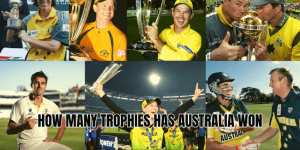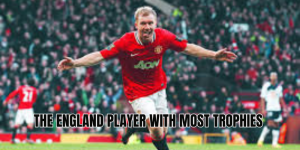From the sweeping libero of Franz Beckenbauer to the ruthless poacher Gerd Müller, Germany’s pitch is littered with legends whose names echo in football halls of fame. At KorKick, we believe that knowing your legends isn’t just history — it’s inspiration. In this article, we’ll journey through the careers, records, and stories behind the most iconic figures in German football. Whether you’re chasing stats or simply want to know which players defined german football legends, you’re in the right place.
What Makes a German Football Legend?
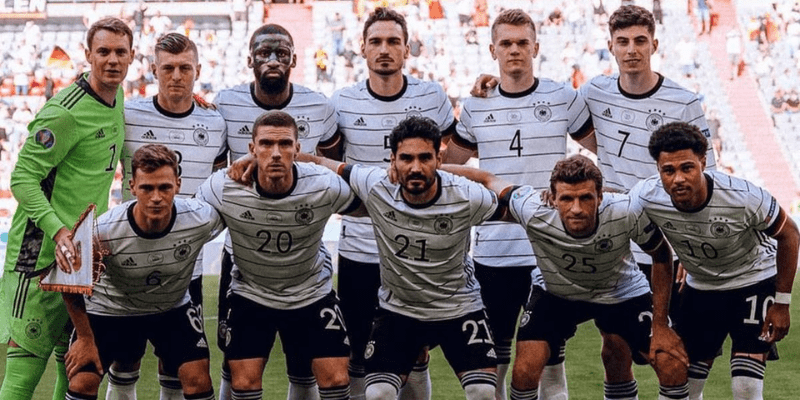
Legends aren’t born. When fans search “germany football legends,” they’re seeking more than names: they want stories, stats, and the “why” behind their immortal status.
Here’s the common thread among the legends we’ll explore:
- Major international success (World Cups, European Championships)
- Monumental club careers and silverware
- Record-breaking or trend-shifting performances
- Cultural resonance with German fans and identity
Let’s dive into the pantheon.
Early Pioneers: Foundations of German Greatness
Before the Bundesliga era, players laid down the bedrock of German football’s identity.
Uwe Seeler – The Heart of Hamburg
Uwe Seeler remains one of the purest symbols of loyalty in German football. He spent his entire prime at Hamburger SV, scoring 404 goals in 476 matches for the club. Internationally, he earned 72 caps and netted 43 goals for West Germany. Even as big clubs courted him, he stayed put. His leadership and passion made him an idol to fans across Germany.
Helmut Rahn – The Final’s Hero
In the 1954 FIFA World Cup final, West Germany faced the formidable Hungary. Enter Helmut Rahn, who struck the decisive goal that pulled off the “Miracle of Bern.” That moment enshrined him in legend forever. Rahn also contributed in the 1958 and 1962 tournaments, leaving a legacy tightly bound to that defining strike.
The Golden Era: Beckenbauer, Müller, and Tactical Revolutions
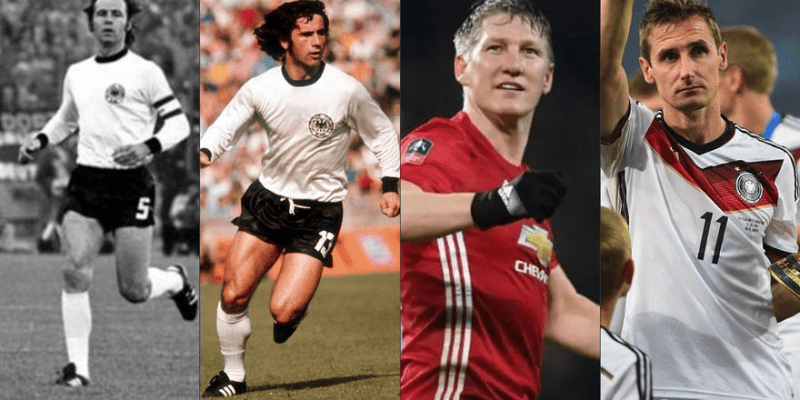
This is where germany football legends truly take shape — players who not only excelled but reshaped how the game was played.
Franz Beckenbauer – The Liberator of Defense
Nicknamed Der Kaiser, Beckenbauer redefined the role of the libero (sweeper). He seamlessly transitioned.
Gerd Müller – The Goal Machine
Dubbed “Der Bomber,” Gerd Müller terrorized defenses with his uncanny ability to score. He scored the winning goal in the 1974 World Cup final and held the all-time World Cup scoring record (14) for decades. His poise in tight spaces and lethal finishing make him one of the greatest strikers ever.
Lothar Matthäus – The Ironman Icon
Matthäus combined versatility, tactical intelligence, and sheer longevity. He amassed 150 caps for West Germany / Germany, making him the most capped male German player. He captained the national side to the 1990 World Cup title and won the 1980 European Championship as well. He played in five World Cups — a rare feat — and starred in club stints at Bayern Munich and Inter Milan. His ability to evolve across midfield and defensive roles sealed his hall-of-fame status.
Later Legends: Leadership, Consistency, and the Modern Era
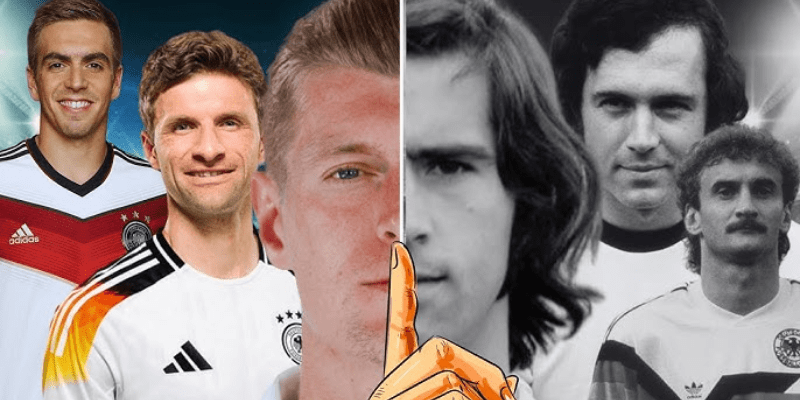
Even as football modernized, German players continued to make history.
Philipp Lahm – The Captain of Harmony
Able to play both fullback sides and defensive midfield, Lahm was the epitome of balance and class. He captained Germany to the 2014 World Cup and lifted the Champions League with Bayern Munich in 2013. His leadership, positional intelligence, and humility earned him respect on and off the pitch.
Oliver Kahn – The Towering Guardian
Between the posts, few were as dominant as Oliver Kahn. His nickname Der Titan spoke to his presence. He won numerous Bundesliga titles and led Bayern Munich to silverware domestically and in Europe. In 2002, he almost single-handedly carried Germany to a World Cup final. His fierce mentality and shot-stopping make him one of the all-time great goalkeepers.
Bastian Schweinsteiger – The Midfield General
Schweinsteiger bridged the old guard to the modern era. His box-to-box energy, grit, and tactical discipline served both Bayern and Germany well. He played a pivotal role in Germany’s Euro 2016 run and was a core component of the 2014 World Cup triumph. His performances in high-pressure matches earned him legendary status.
Toni Kroos – The Metronome Maestro
While still active at a high level, solely for his consistency, leadership, and trophy haul, Toni Kroos belongs on any list of germany football legends. With multiple Champions League titles and a World Cup crown in 2014, he is already etched in history. His controlling passing, composure under pressure, and ability to dictate tempo define modern midfield excellence.
Thomas Müller – The Raumdeuter Extraordinaire
Thomas Müller coined the term Raumdeuter (space interpreter) to describe his role. He doesn’t just occupy positions; he reads space, makes clever runs, and influences games. Müller’s club haul with Bayern Munich is vast, and he played a key role in Germany’s 2014 World Cup win. His energetic, playful personality makes him a fan favorite even as he now steps into new chapters beyond Germany’s national team.
Top 10 Germany Football Legends: A Roundup
To bring it all together, here are ten titans of German football — players who define germany football legends across eras, positions, and styles:
| Player | Position | Key Achievements |
| Franz Beckenbauer | Sweeper / Defender | WC 1974, Euro 1972, 3× European Cup, World Cup as coach |
| Gerd Müller | Striker | 68 goals / 62 caps, 1974 WC winner, record goal scorer |
| Lothar Matthäus | Mid / Defender | 150 caps, WC 1990, Euro 1980, five World Cups |
| Uwe Seeler | Striker | Longtime Hamburg icon, German footballing conscience |
| Helmut Rahn | Winger / Forward | 1954 World Cup final winner |
| Philipp Lahm | Full-back / Mid | WC 2014, Champions League 2013, versatile captain |
| Oliver Kahn | Goalkeeper | Dominant GK era, WC 2002 heroics |
| Bastian Schweinsteiger | Midfielder | Box-to-box engine, WC 2014 trump card |
| Toni Kroos | Midfielder | Tactical anchor, consistency and craft |
| Thomas Müller | Forward / Space interpreter | Club trove, clutch runs, lively personality |
Each name on this list brought something unique: scoring feats, defensive revolution, midfield control, or sheer leadership.
Why These Legends Still Matter
We’re not just celebrating nostalgia. These legends are the roots of modern German football. Coaches still study Beckenbauer’s positioning, forwards chase Müller’s movement, and midfielders aim for Kroos’s precision. Their values — discipline, team over self, relentless work — persist across generations.
For young fans longing to find their heroes, or seasoned fans seeking context, exploring germany football legends gives perspective. When Germany dazzles in tournaments today, it’s built on the shoulders of giants.
Final Thoughts
Germany football legends are more than names — they’re legends etched into every facet of the sport: strategy, culture, emotion. From Rahn’s historic goal to Müller’s lethal strikes and Beckenbauer’s sweeping dominance, every generation has its story. At KorKick, we hope this guide gives you both the facts and the emotional resonance behind these legends.
If you want to dive deeper — player biographies, match-by-match stats, or comparisons across eras — just say the word. Keep coming back. Football’s history isn’t static; it’s alive, and these legends keep whispering through every new match.



